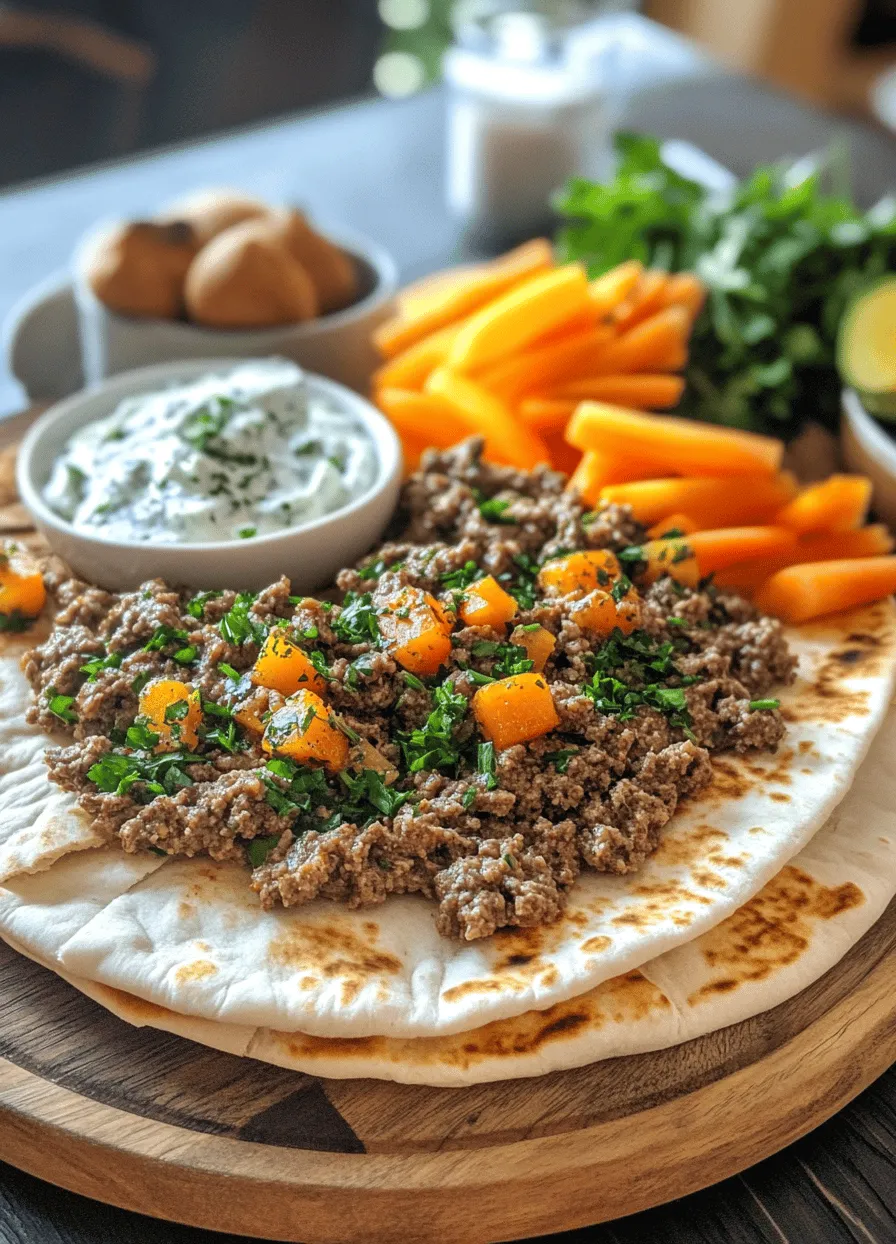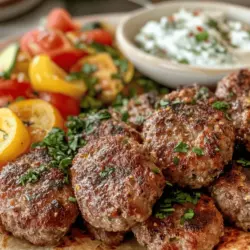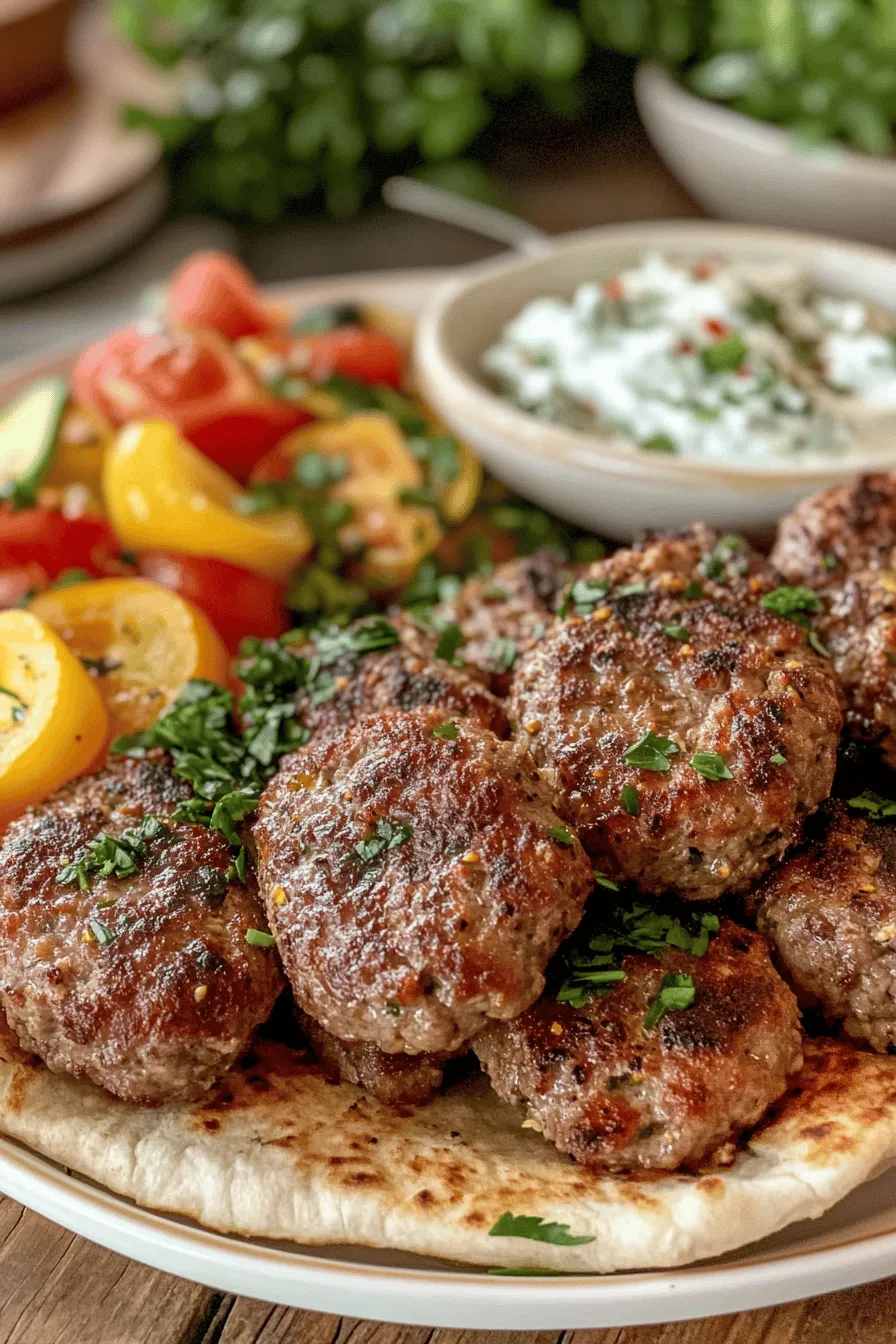Introduction
Gyros, the quintessential Greek street food, have made their way into the hearts and stomachs of food lovers across the globe. With their tantalizing blend of spices, juicy meat, and fresh vegetables, gyros offer a flavorful culinary experience that transports you to the vibrant streets of Greece. Traditionally enjoyed on-the-go, this iconic dish features seasoned meat cooked to perfection, wrapped in a warm pita, and complemented by a host of fresh toppings. As the world embraces the joy of cooking at home, making gyros from scratch provides an exciting opportunity to recreate this beloved dish in your own kitchen.
The allure of crafting your own gyros extends beyond just flavor; it’s about the experience. Preparing homemade gyros allows you to tailor the dish to your taste preferences and dietary needs while also ensuring the use of high-quality ingredients. In this article, we will explore the essential components of a Savory Gyro Delight and guide you through the initial steps of this delightful recipe. From the key ingredients to the preparation of the gyro meat, we will dive into the world of Greek flavors, setting the stage for a delicious meal.
Understanding the Ingredients
To create the perfect Savory Gyro Delight, it’s essential to understand the key ingredients that contribute to its signature taste. At the heart of any gyro is the meat, which can be made from ground lamb or beef. Ground lamb, in particular, is a traditional choice that adds rich flavor and tenderness, making it a favorite among gyro enthusiasts. However, ground beef is a fantastic alternative for those who prefer a leaner option or have dietary restrictions. Whichever meat you choose, ensuring it is fresh and of good quality will significantly enhance your dish.
The aromatic spices used in gyros play a crucial role in elevating the flavor profile. A combination of oregano, cumin, and smoked paprika creates a harmonious blend that embodies the essence of Greek cuisine. Oregano, a staple herb in Mediterranean cooking, brings a warm, earthy note, while cumin adds a hint of warmth and depth. Smoked paprika introduces a subtle smokiness that complements the meat beautifully. Together, these spices create a robust flavor that will tantalize your taste buds.
Fresh parsley and onion are additional key players in this recipe. Parsley not only adds a burst of color but also brings a fresh, herbal note that balances the richness of the meat. Finely chopped onions contribute sweetness and depth, enhancing the overall flavor profile. The combination of these ingredients creates a symphony of flavors that will tantalize your palate.
When preparing your Savory Gyro Delight, it’s also crucial to consider the health aspects of your ingredient choices. Using high-quality olive oil, a hallmark of Mediterranean cooking, not only adds flavor but also provides healthy fats that are beneficial to your overall health. Additionally, opting for lean meat ensures that you can enjoy this indulgent dish without compromising on nutrition.
Preparation Steps for Gyro Meat
Now that we’ve covered the essential ingredients, it’s time to delve into the preparation of the gyro meat. The process begins with the mixing of the ingredients, which is critical for achieving the desired texture and flavor. Start by combining the ground meat with the spices, parsley, and onions in a large mixing bowl. Using your hands, gently mix the ingredients until they are evenly distributed. Be careful not to overmix, as this can lead to a dense texture; your goal is to combine the ingredients while still keeping some air in the mixture.
Once you have achieved a uniform mixture, it’s time to shape the gyro meat. There are two popular options for shaping: the loaf and the cylindrical shape. Each has its pros and cons. The loaf shape is easier to manage and can be cooked as a whole, ensuring even cooking throughout. However, the cylindrical shape can provide a more traditional presentation and allows for quicker cooking. Whichever shape you choose, ensure that the meat is compact and evenly shaped to promote consistent cooking.
Achieving the perfect consistency in gyro meat is essential for the final product. The mixture should be moist but not overly wet; a good benchmark is to ensure it holds its shape when formed into a loaf or cylinder. If the mixture feels too loose, consider adding breadcrumbs or a small amount of flour to help bind it together. Conversely, if it seems too dry, a drizzle of olive oil or a splash of water can help achieve the right texture.
Cooking the Gyro Meat
With the gyro meat prepared, the next step is cooking it to perfection. There are various methods to cook gyro meat, including baking, grilling, or pan-frying. Each method has its benefits, but for the best flavor and texture, grilling or baking is recommended. Preheat your grill or oven to medium heat, ensuring that the cooking surface is adequately heated before placing the meat on it.
Cooking gyro meat at medium heat is crucial for achieving that signature juicy texture. Too high of a heat can lead to burnt exteriors and undercooked interiors, while too low of heat may result in dry meat. Monitor the cooking process closely, and don’t hesitate to adjust the heat as necessary to maintain an even cooking temperature.
As the gyro meat cooks, keep an eye out for visual cues that indicate it’s ready. The meat should develop a beautiful golden-brown crust on the outside, and when sliced, it should reveal a moist, tender interior. The internal temperature should ideally reach at least 160°F (71°C) for ground beef and 165°F (74°C) for ground lamb to ensure it is fully cooked.
Once the gyro meat is cooked to perfection, allow it to rest for a few minutes before slicing. This resting period is vital, as it enables the juices to redistribute throughout the meat, ensuring every bite is succulent and flavorful. Slice the meat thinly, against the grain, to enhance tenderness and make it easier to enjoy in your gyros.
As you embark on this culinary journey, preparing your Savory Gyro Delight at home promises an experience filled with rich flavors and the satisfaction of crafting a beloved dish from scratch. With the right ingredients and techniques, you’ll be well on your way to creating a delicious meal that captures the essence of Greek cuisine.

Serving Suggestions
When it comes to serving gyros, there are traditional ways that have stood the test of time, as well as creative presentations that can elevate your meal. The classic way to enjoy gyros is by wrapping the flavorful meat in warm pita bread, generously drizzled with tzatziki sauce. This combination not only enhances the taste but also adds a delightful texture to the dish.
Traditional Ways to Serve Gyros
Typically, gyros are served as a handheld meal, perfect for a casual dining experience. The essence of gyros lies in its simplicity, allowing the flavors of the meat to shine through. Start by placing the cooked gyro meat in the center of a soft, warm pita. Next, add a generous dollop of tzatziki sauce, which balances the savory richness of the meat.
Wrapping in Pita Bread with Tzatziki Sauce
To wrap your gyro, begin with a circular piece of pita bread. Place the meat in the center, followed by a good amount of tzatziki. The sauce not only complements the meat but also provides moisture, preventing the pita from becoming dry. Carefully fold the bottom of the pita up over the filling, then fold in the sides to create a neat pocket. This makes for an easy-to-eat meal that encapsulates all the deliciousness in every bite.
Incorporating Fresh Vegetables
Adding fresh vegetables is another excellent way to serve gyros. Classic toppings include crisp lettuce, succulent tomatoes, and thinly sliced onions. These fresh ingredients not only add crunch but also enhance the flavors of the dish, creating a well-rounded meal. Consider using seasonal vegetables to elevate your gyro experience further. For instance, adding sliced cucumbers can offer a refreshing bite, while roasted red peppers can introduce a sweet, smoky flavor.
Exploring Creative Topping Options for Personalization
Don’t hesitate to experiment with toppings to personalize your gyros. Options like crumbled feta cheese, briny olives, or tangy pickled vegetables can add exciting layers of flavor. Feta cheese brings a creamy, salty element that pairs beautifully with the savory meat, while olives introduce a nice touch of brininess. Additionally, pickled vegetables, such as radishes or carrots, can add a tangy crunch that contrasts well with the rich ingredients.
Tzatziki Sauce: The Perfect Accompaniment
Tzatziki sauce is an essential component of the gyro experience, offering a cooling contrast to the warm, spiced meat. Its refreshing flavor profile makes it a staple in Greek cuisine and beyond.
Explanation of Tzatziki Sauce and Its Cultural Significance
Originating from Greece, tzatziki is a yogurt-based sauce that has been enjoyed for centuries. Traditionally, it serves as a dip or condiment, complementing various Mediterranean dishes. Its cultural significance lies in its representation of the fresh, vibrant flavors of the region, often served alongside grilled meats and vegetables.
Basic Recipe for Homemade Tzatziki Sauce
Creating tzatziki sauce at home is simple and requires just a few basic ingredients. Here’s a straightforward recipe that you can follow:
Ingredients:
- 1 cup Greek yogurt
- 1 medium cucumber, finely grated and excess water squeezed out
- 2 cloves garlic, minced
- 1 tablespoon olive oil
- 1 tablespoon fresh dill, chopped (or 1 teaspoon dried dill)
- Salt and pepper to taste
- A squeeze of lemon juice (optional)
Instructions:
1. In a mixing bowl, combine the Greek yogurt, grated cucumber, minced garlic, olive oil, and dill.
2. Mix well until all ingredients are thoroughly incorporated.
3. Season with salt and pepper to taste. If desired, add a squeeze of lemon juice for extra brightness.
4. Refrigerate for at least 30 minutes to allow the flavors to meld. Serve chilled.
How to Prepare Tzatziki Sauce to Enhance the Gyro Experience
Tzatziki sauce is best served cold alongside your gyros. Its creamy texture and refreshing taste make it the ideal dip for the warm meat and pita. When serving, consider placing a small bowl of tzatziki on the table for guests to add as they please. This allows everyone to control the amount they want, enhancing the overall gyro experience.
Cultural Significance of Gyros
Gyros are more than just a delicious meal; they embody a rich history within Greek cuisine. Understanding the cultural significance of gyros can deepen your appreciation for this beloved dish.
Brief History of Gyros in Greek Cuisine
The term “gyros” comes from the Greek word for “turn,” referring to the way the meat is cooked on a vertical rotisserie. This cooking method has roots in the Middle Eastern shawarma and the Turkish döner kebab, but gyros has evolved into a distinct Greek dish. Traditionally, gyros were made with pork, though today, chicken, beef, and lamb are also popular choices.
The Evolution of Gyros from Street Food to Global Popularity
Initially, gyros was a street food enjoyed by locals in Greece, often sold from food trucks and small eateries. Its popularity quickly spread, leading to its inclusion in menus worldwide. Gyros has become a symbol of Greek fast food, representing a quick yet flavorful meal option. Today, you can find gyros in restaurants and food stalls across the globe, showcasing its universal appeal.
Regional Variations in Gyro Preparation and Serving
While the classic gyro consists of meat, pita, and tzatziki, regional variations exist that highlight local ingredients and preferences. For instance, in some parts of Greece, gyros may be served with different sauces, such as mustard or hot sauce, while others may incorporate unique spices or herbs. These variations reflect the diversity of Greek cuisine and allow for a personalized approach to this traditional dish.
Nutritional Information
With its combination of ingredients, the Savory Gyro Delight offers a nutritious meal option that can fit various dietary preferences.
Breakdown of the Nutritional Content of the Savory Gyro Delight
A typical serving of a gyro, including pita, meat, vegetables, and tzatziki, can provide a balanced mix of macronutrients. Depending on the meat used, the nutritional content may vary:
- Protein: The meat, whether lamb, beef, or chicken, contributes a significant protein source, essential for muscle repair and overall body function.
- Carbohydrates: The pita bread provides carbohydrates, offering energy for your body.
- Fats: Healthy fats are present in the tzatziki sauce and any added olive oil, promoting heart health.
- Vitamins and Minerals: Fresh vegetables add vitamins A, C, and K, along with dietary fiber that aids digestion.
Health Benefits of Using Ground Lamb or Beef
Using ground lamb or beef in gyros not only adds rich flavor but also provides several health benefits. Both meats are excellent sources of iron, which is crucial for blood production and energy levels. Additionally, they provide B vitamins, particularly B12, which supports nerve function and red blood cell production.
Discussing Portion Sizes and Serving Suggestions for Balanced Meals
When serving gyros, it’s important to consider portion sizes to maintain a balanced meal. A single gyro, accompanied by fresh vegetables and a side of tzatziki, can be a complete meal on its own. For a more balanced approach, consider serving gyros with a side of Greek salad or roasted vegetables to increase your intake of fiber and antioxidants.
Conclusion
The journey of making the Savory Gyro Delight is both savory and aromatic, culminating in a meal that is as enjoyable to prepare as it is to eat. From the carefully seasoned meat to the refreshing tzatziki sauce, each component contributes to a delightful dining experience.
As you explore the world of gyros, don’t hesitate to experiment with different flavors and ingredients. Whether it’s switching up the type of meat, adding unique toppings, or trying new sauces, there are endless possibilities to make this dish your own.
Cooking is not just about following a recipe; it’s about the joy of sharing homemade food with friends and family. So gather your loved ones, serve up some delicious gyros, and savor the warmth of great food and great company. Enjoy the process, and let each meal be an opportunity to create lasting memories around the table.


